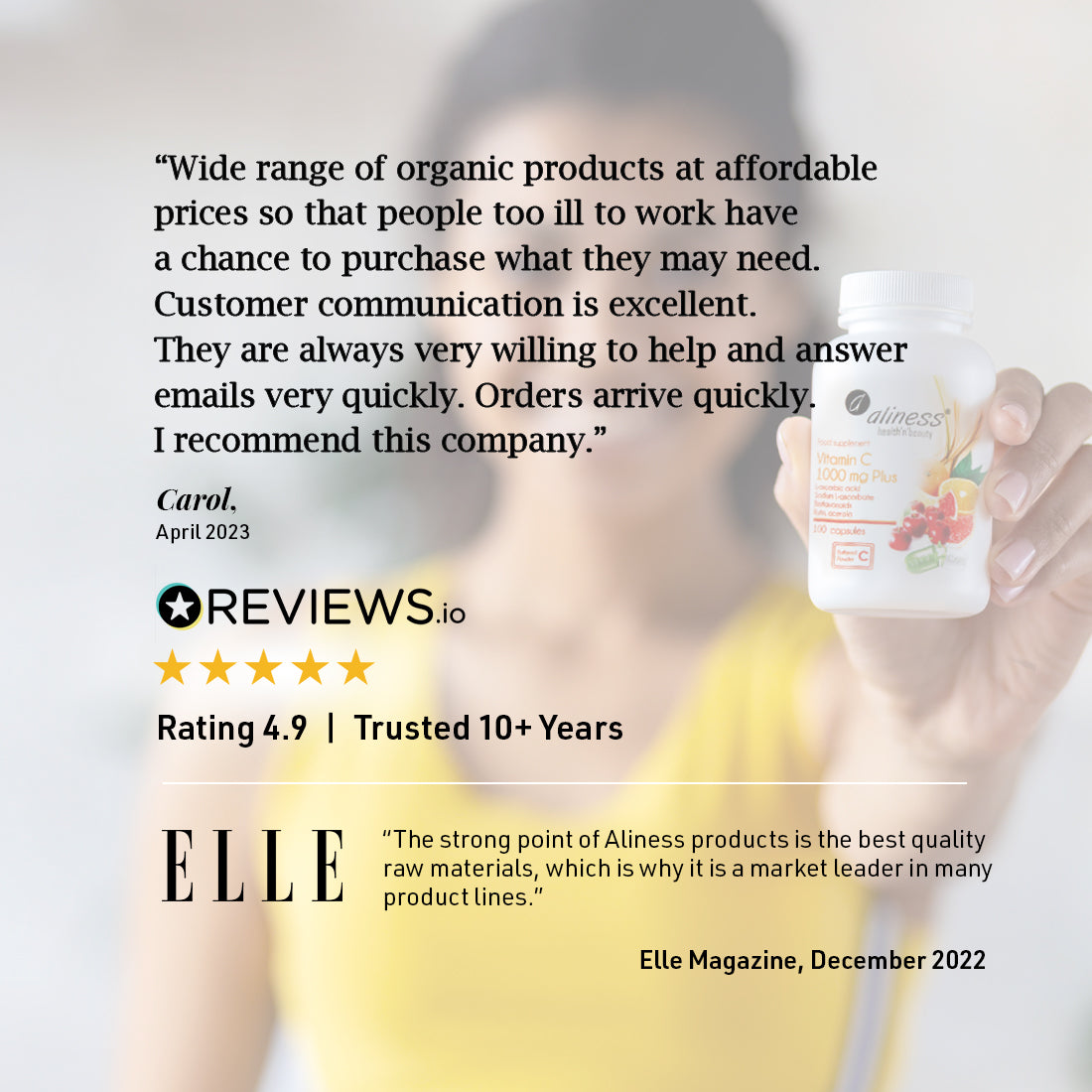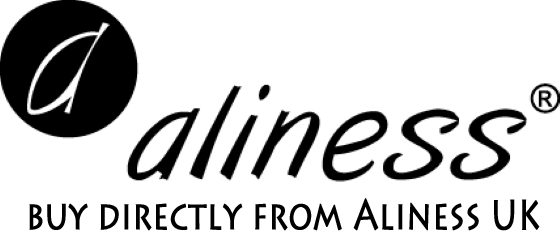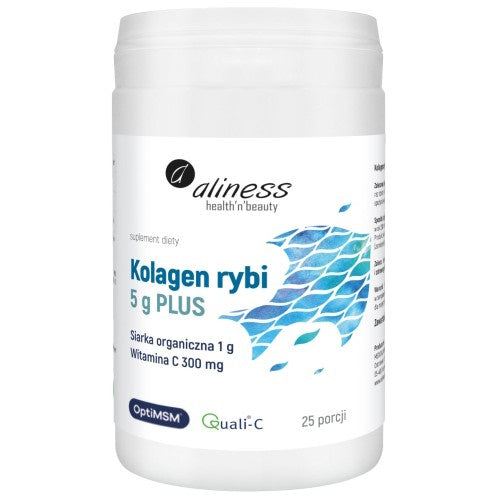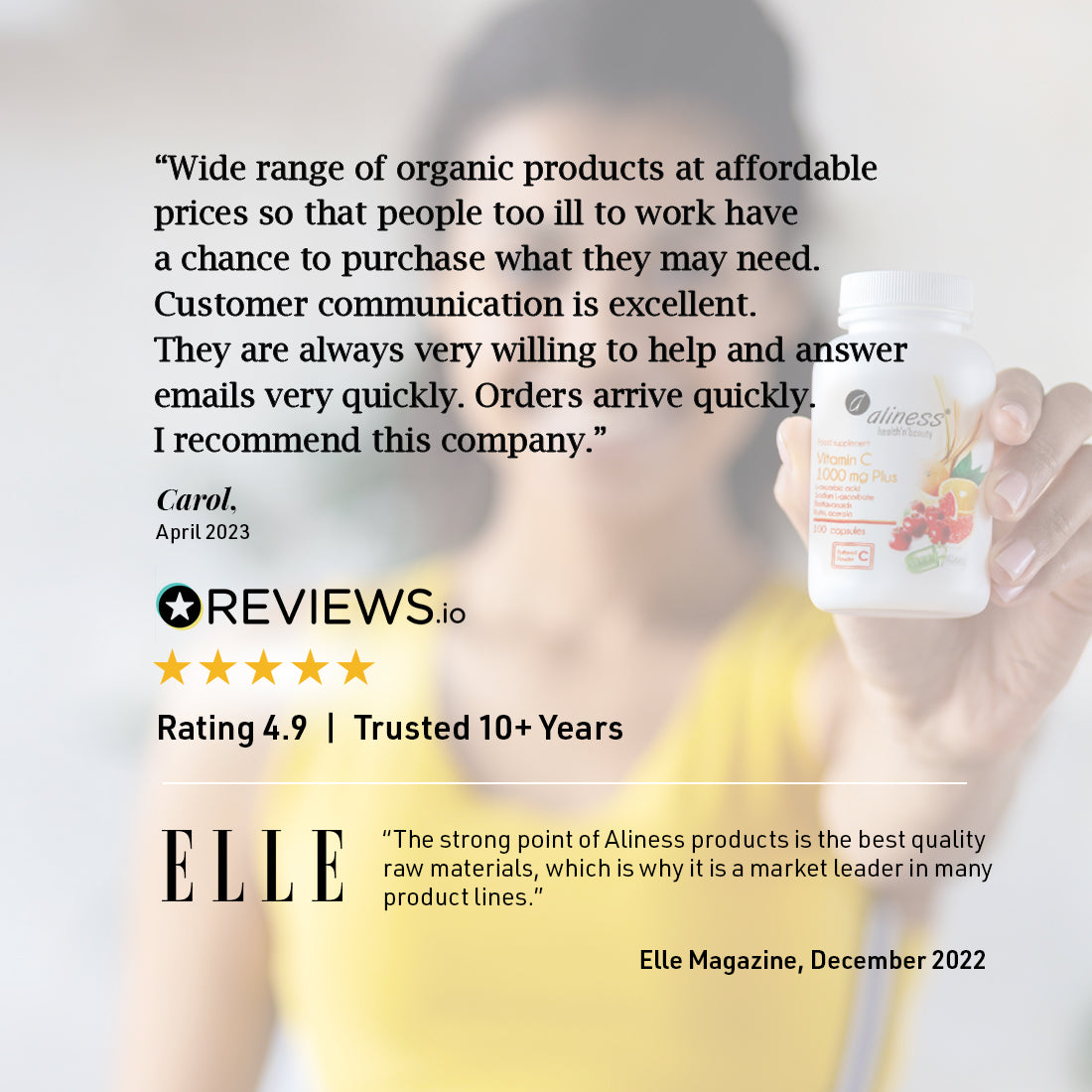As seen in
- See more:
- Collagen Supplements
Aliness
Fish Collagen PLUS, Organic Sulfur with Vitamin C
Fish Collagen PLUS, Organic Sulfur with Vitamin C
- ✓ Highest quality supplements manufactured to top EU standards
- ✓ Free from traces of allergens




In UK stock, Next Day Delivery Available
Couldn't load pickup availability
- Same day dispatch from the UK Warehouse (up to 1pm Mon-Fri). Now also shipping to the EU and North America.
- No quibble 90 day FREE returns
- UK's largest stock of Aliness products in our Oxfordshire warehouse. We deliver the products faster than anybody else in the UK. Buy with confidence that you won't pay any duty or extra import tax.


Join Our 40,000 Happy Customers
Rated Excellent 4.8/5
⭐⭐⭐⭐⭐
"I love Aliness products. Very high quality. I'm working as a personal trainer and when I write diet and supplementation plans for my clients, I base them on Aliness supplements. I know it works, as I have blood tests results. Top quality. Thank you. "
- Agata
Description
Food supplement, 25 servings
Free from:
- Gluten
- Lactose
- Soy
- GMO
|
Ingredients |
1.5 scoops (daily portion) |
%NRV* |
|
Wild COD collagen (type I + type III) (FISH) |
5000 mg |
- |
|
optiMSM® (metylosulfonylometan) |
1000 mg |
- |
|
Vitamin C Quali®-C (L-ascorbic acid) |
300 mg |
375% |
|
*NRV - daily reference intake value for adults |
|
|
Ingredients: hydrolyzed FISH collagen, methylsulfonylmethane (optiMSM®), Vitamin C Quali®-C (L-ascorbic acid).
OptiMSM® is a trademark of Balchem Corporation and its subsidiaries.
Fish collagen 5g PLUS
Recommended daily dose: 1.5 scoops once a day.
Do not exceed the recommended daily dose.
Preparation method: Dissolve 1.5 scoops of powder in about 200 ml of cool water. Mix thoroughly.
The product should not be used as a substitute for a varied diet.
It is recommended to follow a balanced diet and a healthy lifestyle.
Storage conditions: Store at room temperature out of the reach of children. Protect from moisture.
Collagen is one of the most important and complex natural polymers. A characteristic feature of all collagen proteins is a macromolecule with the structure of a right-handed superhelix formed by winding three single, left-handed polypeptide chains, each of which contains about 1,000 amino acids.
Collagen is the main component of the extracellular matrix and is present in virtually all body tissues (skin, tendons, cartilage, bones, teeth, blood vessel walls, intrabody membranes), providing them with resistance to stretching.
In addition to its biomechanical role, collagen, by interacting with specific receptors, influences the processes of cell adhesion, differentiation, growth and survival. It plays an important role in organ development, tissue repair and wound healing.
As a biological polymer, collagen is constantly synthesized and degraded in the intercellular space. In a young and healthy body, collagen is regularly replaced (approx. 3 kg per year) and systematically rebuilt. The synthesis of collagen fibres is involved, among others, estrogens, insulin and thyroid hormones, the availability of vitamin C also has a beneficial effect.
So far, 29 types of collagens with different structures, functions and occurrences in the body have been isolated and described.
It is estimated that about 90% of the collagen in the human body is type I collagen, types II and III are also popular.
Type I collagen is found in the skin, bones, tendons, ligaments and cornea. The combination (braiding) of type I collagen fibres with type III collagen gives tissues elasticity.
With age, the synthesis of endogenous collagen decreases, it is damaged and lost, and cell renewal slows down. Factors contributing to a decrease in the amount and strength of natural collagen include: UV radiation, smoking, hormonal disorders, exposure to toxic substances, and genetic conditions. All these factors cause the formation of reactive oxygen species (free radicals) that degrade the structure of collagen fibres.
Vitamin C (ascorbic acid) is very biologically active. It takes part in many extremely important reactions and transformations, stimulating various biochemical processes in the body. The action of vitamin C in the human body mainly involves the transfer of electrons, which is important for the proper conduct of many processes. Ascorbic acid provides electrons to, among others, enzymes involved in the formation of collagen cross-links in the process of hydroxylation of proline and lysine. Hydroxylation is necessary to form the strong bonds of the collagen helix.
Ascorbic acid is the most famous antioxidant. The unique structure of ascorbic acid, which contains two adjacent groups, hydroxyl and carbonyl, makes this molecule an excellent hydrogen or electron donor. Vitamin C maintains an appropriate oxidation-reduction potential and participates in neutralizing reactive oxygen and nitrogen species, protecting cells against oxidative damage.
Vitamin C:
- helps in the proper production of collagen to ensure the proper functioning of blood vessels;
- helps in the proper production of collagen to ensure the proper functioning of bones;
- helps in the proper production of collagen to ensure the proper functioning of cartilage;
- helps in the proper production of collagen to ensure the proper functioning of the gums
- helps in the proper production of collagen to ensure the proper functioning of the skin;
- helps in the proper production of collagen to ensure the proper functioning of teeth;
- contributes to maintaining proper energy metabolism;
- helps in the proper functioning of the nervous system;
- helps maintain proper psychological functions;
- helps in the proper functioning of the immune system;
- helps protect cells against oxidative stress;
- helps reduce the feeling of fatigue and weariness;
- helps regenerate the reduced form of vitamin E;
- increases iron absorption.
MSM (methylsulfonylmethane), also known as dimethylsulfone (DMSO2)
and methylsulfone, is an organic sulphur-containing compound. After calcium and phosphorus, sulphur is the third most common element in our body.
Sulphur takes part in oxidation and reduction reactions, regulates the permeability of the cell membrane, stabilizes protein molecules, and participates in the formation of collagen.
sulphur also takes part in the synthesis of nucleic acids, enters into organic compounds of proteins and enzymes, oxidases, reductases, hydrolases, transferases. It is incorporated into methionine and cysteine, and together with its oxidized form -s-s cystine, is responsible for the creation of the active oxidoreductive centre of glutathione.
Sources of sulphur in food may be high-protein products, meat and offal, eggs, and milk. Plant products containing large amounts of sulphur include: onion, garlic, oats, cabbage, peas, potatoes, broccoli, cauliflower, radish, turnip, cress, artichokes, horseradish, tomatoes, asparagus, avocado, celery, pear.
Why OptiMSM®?
OptiMSM® is the only GRAS-listed MSM, it is also the only MSM produced in the USA and manufactured in a dedicated cGMP compliant facility. OptiMSM is purified in a patented multi-stage distillation process. The process removes impurities and results in a repeatable, extremely pure form of MSM. *

“The strong point of Aliness products is the best quality raw materials, which is why it is a market leader in many product lines.”
Elle Magazine, December 2022



